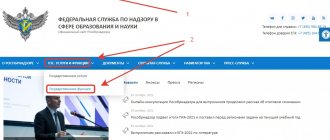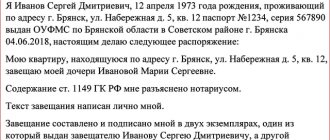How to check a will while the testator is alive?
Only he knows which will is genuine during the lifetime of the property owner. Heirs or other citizens cannot possess this information.
This is due to the fact that the Civil Code establishes the secrecy of a will. Therefore, the notary, witness, executor, executor and other citizens who are present during the execution of the will do not have the right to disseminate the information received.
Art. 1123 of the Civil Code of the Russian Federation establishes the right of the testator to receive compensation for moral damage in the event that someone disseminates his secret.
Moreover, a will can be changed countless times during the owner’s lifetime. Therefore, its authenticity does not matter much. It may be changed at any time.
Methods of inheritance
Inheritance can occur in two ways – by law/will. In most cases, citizens inherit property within the framework of the law.
The principle of priority applies here. The priority right belongs to the parents, children, and spouse of the testator.
Heirs of the second stage according to Art. 1143 of the Civil Code of the Russian Federation are the brothers and sisters of the deceased subject. If the testator had dependents, then they are included in the applicants of the corresponding queue.
If there is an order, the situation changes radically. The composition and shares of the heirs are determined by the will.
If the testator has written off all the property, then the legal heirs are left with nothing. In cases where only part of the property appears in the disposition, the remainder of the assets is inherited within the framework of the law.
Mandatory heirs according to Art. 1149 of the Civil Code of the Russian Federation provides for a portion of the property regardless of the last will of the testator. If they are specified in the order, then the rule on the mandatory part does not apply. The only condition is that their share should not be less than ½ of the share that would be due to them upon inheritance by law.
Important! Regardless of the method of inheritance, applicants must declare acceptance of the inheritance within six months.
How to check a will after the death of the testator?
After the death of the owner, the will comes into force.
The person named in the will receives the deceased's property. Therefore, during this period, the authenticity of the document is of particular importance. Judicial practice has examples of a significant number of disputes arising from forged wills. Therefore, in 2021, a practice has already been formed to identify false documents.
So, how do you know that a will found in a closet, or presented to a notary by another relative, is genuine?
Notarial
Since 2014, the Unified Notarial Information System on Wills has been operating in the Russian Federation. Information about each declaration of will drawn up by a notary is necessarily recorded in it. In order to preserve the secrecy of the will, the register does not include information about the contents of the document.
Therefore, in order to clarify the authenticity of the will, it is enough to contact any notary in the country and present him with the document. To obtain information, it is enough to provide the notary’s office with a death certificate of the owner of the property.
The specialist will check the document details and provide the following information:
- whether the document is genuine;
- Is there a document drawn up after the one presented?
Separately, it is necessary to highlight wills that are equivalent to notarial wills. These are documents certified by authorized persons:
- captain of the ship;
- head physician of the hospital;
- expedition leader;
- commander of a military unit;
- head of the prison.
The document signed by such a person must be transferred as soon as possible to the notary at the place of permanent registration of the testator. And the notary, accordingly, must enter information about it into the Unified Information System.
In this situation, the person who certified it is responsible for the authenticity of the document. But heirs will be able to obtain information about him by requesting information from a notary.
Compiled in an emergency
Art. 1129 of the Civil Code of the Russian Federation provides for the opportunity for a testator to draw up a document without contacting a notary office. You can resort to it if the life and health of a citizen is in danger. For example, in the event of military action, emergency, disaster, serious injury.
In this case, the citizen can draw up a will in writing and have it certified by the signatures of two witnesses. They must understand the Russian language, be of age and legally capable.
If the citizen survives the emergency, the document is valid for another 30 days. After which he must contact a notary office to have it certified. Otherwise, the will becomes invalid.
But legal successors will be able to enter into an inheritance under such a document only by confirming in court that the situation was an emergency. For example, after a heavy snowfall, the roads to a populated area were swept away and it was impossible to get to the notary, and the deceased was seriously injured.
You can verify the authenticity of a document using handwriting examination, as well as by interviewing witnesses who certified the document.
Grounds for challenging a will
Any person whose rights have been violated can file a claim in court to challenge a posthumous order. This right belongs to:
- claimants under a will;
- family members of the deceased subject;
- executor;
- legatee;
- legal representative of a minor whose rights are violated by the will;
- guardian of an incapacitated person whose rights have been violated;
- a person entitled to an obligatory share.
Grounds for challenging a will
| No. | Name of base | Cause |
| 1 | Testator's insanity | Heirs very often go to court for this reason. After all, it is extremely difficult to simply challenge the authenticity of an order. Especially if it has been notarized. However, quite often orders are drawn up during a period of long-term illness of a person. The testator is not always aware of the consequences of his actions. During the court hearing, a forensic psychiatric examination is carried out. If its results coincide with the suspicions of the heirs, then the court will invalidate the will. |
| 2 | Coercion from relatives | A will drawn up under pressure or as a result of deception of the testator is subject to invalidation in court. However, proving this fact will not be easy. |
| 3 | Recognition of the heir as unworthy | To recognize an heir as unworthy in accordance with Art. 1117 of the Civil Code of the Russian Federation, the key factor is the commission of illegal actions against the testator. One of them is an attempt to influence the will of the testator when distributing the inheritance or calling on third parties to commit similar actions. |
| 4 | The order was signed by another person | The heir will have to order a handwriting examination. If she confirms the suspicions, the will will be declared invalid. However, the rule does not apply if he was very ill or was illiterate (Article 1125 of the Civil Code of the Russian Federation). In such circumstances, another person signs the will. The document indicates the reasons for attracting a third party and his data (full name, registration address). |
The above grounds make it possible to eliminate the consequences of illegal actions that were committed when drawing up a will. However, they will not help determine the authenticity of the order. Such conclusions are made exclusively by experts within the framework of legal proceedings.
Example. After the death of their father, the heirs learned about the existence of a will. The testator assigned his apartment to a distant relative. The deceased man's wife and children were not mentioned in the order. Family members did not believe that the father was capable of such a thing. They ordered a handwriting examination. She testified that the signature did not belong to the testator. The legal heirs were ready to go to court. However, we first contacted the applicant under the will. The man insisted that he knew nothing about the procedure for drawing up a will. However, in the presence of such arguments, he renounced his rights to the property. Family members entered into inheritance rights. The case did not go to trial.
Duration of storage of a will
The will is kept for a certain period of time. Two copies of the paper are kept. Until death, the paper is kept by the notary and the testator. The will regarding bequeathed property and the distribution of the inheritance can be indicated by a closed type of document. The order of the deceased can radically change the inheritance procedures provided for by law, based on family ties.
Until the death of the testator, a copy of the document is kept by the notary. After the death of the owner, he can disclose the contents of the left order to relatives and interested parties. The procedure for saving paper does not have a statute of limitations, since a specialist at a notary’s office can only learn about the death of the preparer from interested parties.
How long does it take to accept an inheritance?
The inheritance must be accepted by the Civil Code of the Russian Federation, Article 1154. The period for accepting an inheritance is within six months from the date of the person’s death or the day on which he was declared dead. Those who can receive the property of the deceased only if the heirs of the previous orders do not accept it have three months after the expiration of six months.
If the heirs of the previous orders renounce their rights, the next applicants have 6 months starting from that day.
The deadline for entering into an inheritance can be renewed, but this requires valid reasons - for example, you were seriously ill or were abroad and did not know about the death of the testator.
Database and unified register of the Russian Federation: is there access for citizens?
Each person can now find a probate case himself and contact a notary for free by accessing the appropriate database and register of wills. The electronic register of wills assumes that notaries electronically enter into the register entries about certified wills, their cancellation and the opening of inheritance cases.
To preserve the secrecy of the will of the deceased, the register does not indicate information about the contents of the will (information about heirs, shares of property, and so on).
On the website of the Federal Chamber of Notaries, you can check the availability of inheritance cases after the death of any person. There is also information about the telephone numbers and addresses of notaries with whom they are open.
This service makes life easier:
- recipients of inheritance;
- those who seek what is due to them;
- who doesn’t know how to check and where to go.
The service will serve lawyers who help relatives of the deceased deal with inheritance.
Search actions are carried out in a certain sequence:
- Open the website section for searching for a testator: https://data.notariat.ru/directory/succession/search.
- In the search form that appears on the screen, enter the data of the deceased (exact data of last name, first name, patronymic).
- Receive open information - year of death, full name of the testator, data of the specialist who opened the inheritance file.
Recommendations for using the service are given below.
- It is important to enter data in the following order: Last name - First name - Patronymic. The system will accept a different input format, but will not generate an error and there will be no search result.
- You should check each letter entered. To be on the safe side, you should try different ways of entering the testator’s name with possible letter options.
Anyone can obtain information about an inheritance matter. It is no longer possible to hide the inheritance.
With the help of this service, nothing can be found out other than the fact of an open inheritance case and the notary’s contacts. An outsider will not be able to find out the name of the heir and what property was included in the inheritance mass.
How much will it cost to receive an inheritance?
For a certificate of the right to inheritance, you will have to pay the state duty of the Tax Code of the Russian Federation, Article 333.24. Amounts of state fees for performing notarial acts. For children, spouse, parents, brothers and sisters of the deceased, it will be 0.3% of the value of the property received - but not more than 100 thousand rubles. The rest will have to pay 0.6% - but not more than 1 million rubles.
The value of property is determined by specialized government agencies or specialized organizations with a license.
State duty may not be paid:
- Heroes of the Soviet Union and the Russian Federation, full holders of the Order of Glory, participants and disabled people of the Second World War.
- Citizens receiving housing in which they lived together with the deceased.
- Those who inherit bank deposits, insurance, royalties.
- Heirs of persons who died while performing civic duty or became victims of political repression.
Can a notary hide data?
Based on Article 61 of Federal Law No. 4462-1 “On Notaries” dated February 11, 1993, the notary’s duties include notifying the heirs about the opening of the case.
He can notify interested parties in two ways:
- by personally notifying about this (if the contacts of the heirs are known);
- by posting a public announcement (in the media).
In accordance with the Fundamentals of the legislation of the Russian Federation on notaries, approved by the Supreme Court of the Russian Federation dated February 11, 1993 No. 4462-1, concealment of such information is fraught with deprivation of a license.
Consequences of challenging the authenticity of an order
Based on the results of the trial, a decision is made to satisfy or reject the claim. The parties are given one month to appeal the procedural document.
After which the court decision receives legal force. If the plaintiff or defendant files an appeal, then the decision of the court of 1st instance comes into force based on the results of its consideration.
If the court invalidates a will, the legal consequences will depend on the stage of the inheritance case:
- The inheritance case was suspended.
- The heir took over and received a certificate.
- The applicant managed to sell the property.
If the case is suspended, the notary resumes it. According to the will, the claimant is excluded from the inheritance.
If the will was not the only one, then the previous version of the order comes into force. If there is one document, family members of the deceased citizen are called upon to inherit. In case of their absence, the inheritance passes to the next relatives.
If the heir managed to receive the certificate, it is considered invalid. The deceased's property is returned to its original condition. The procedure for inheriting property is determined by law.
Sometimes successors manage to obtain a certificate, register ownership and sell the property. In such circumstances, they will have to reimburse the value of the inherited assets. Applicants for property can present their claims to them.
Independent examination
A will is considered genuine if it is executed according to the law:
- a capable person;
- of one's own free will;
- on their own initiative;
- personally or in his words.
The examination will help determine whether these conditions were met when writing the text. If the will is handwritten, the appraiser will check:
- whether the testator really wrote;
- did he do it freely, without pressure and fear.
A handwriting examination is carried out if relatives can provide the evaluator with handwriting samples for comparison.
The appraiser will also check the technical side of the will: whether the date of production of the form corresponds to the date of the will (whether it was written recently), whether the stamps, signatures are real, etc.
If everything turns out to be true, the will will be recognized as genuine. The conclusion that the paper is falsified is a direct route to court.
Important! Even if the result of the examination leaves no doubt about its veracity, relatives have the right to ask the court to check the paper again.





